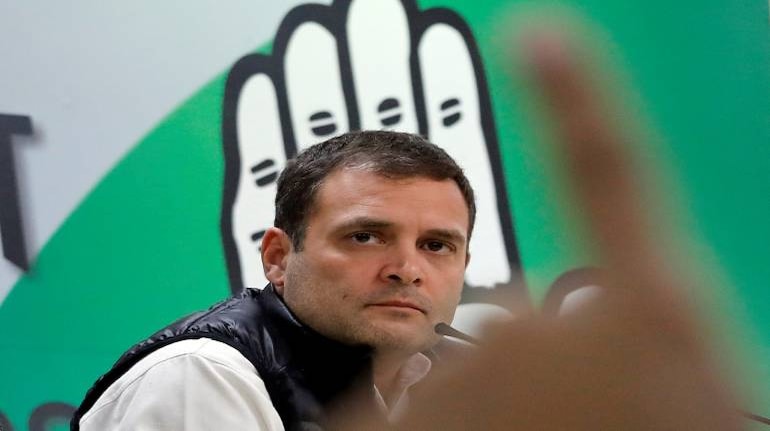



The Congress’ grand strategy to use the controversial Citizenship Amendment Act (CAA) to corner Assam’s ruling Bharatiya Janata Party (BJP) did not yield the desired outcome.
The results of the 126-member Assam assembly polls that came out on Sunday put a big question mark on the future of the grand old party in the state. This is the second consecutive defeat for the party that ruled Assam for 15 years at a stretch -- from 2001 to 2016.
This time, the party will likely manage to improve its seat tally marginally. It is leading in 29 seats out of 90 it contested at the time of writing. Its partners of the ‘grand alliance’ are leading in 17 out of 36 seats where they fielded their candidates.
In the 2016 polls, the Congress won 26 seats and its allies 14 while the BJP-led National Democratic Alliance won 86.
The Congress fought this election in alliance with the AIUDF, BPF, CPI(M), CPI, CPI-ML and the Anchalik Gana Morcha.
However, the biggest embarrassment for the Congress came from its state unit president Ripun Bora who, for the second time, lost in the Gohpur seat.
Why CAA did not work for CongressAhead of the polls, the Congress had promised to repeal CAA, which essentially grants Indian citizenship to Hindu migrants from neighbouring countries. The party maintains that the citizenship law is “discriminatory” and “unconstitutional” as it “violates” Articles 14 of the Indian Constitution that guarantees equality under the law to all persons irrespective of creed, caste or gender.
Besides the Congress, two newly floated regional outfits, one of which is led by jailed peasants rights activist Akhil Gogoi, had highlighted CAA prominently in their poll campaigns.
The CAA sparked nationwide protest and large-scale violence in some states. Four people were killed in Assam in police firing during the December 2019 anti-CAA agitation.
In Assam, the anti-CAA protests were mainly led by the influential All Assam Students Union, Asom Jatiyatabadi Yuba Chatra Parishad (AJYCP) and Akhil Gogoi’s Krishak Mukti Sangram Samiti (KMSS).
The Congress, which had largely played a back-bencher role during these protests, had hoped to capitalize on popular sentiment. However, the biggest setback for the Congress came when these outfits announced the formation of political parties in the run-up to the assembly polls.
To make matter worse for the Congress, the newly-floated Assam Jatiya Parishad backed by the AASU & AJYCP and Akhil Gogoi’s Raijor Dal had announced their equidistance from the BJP and the Congress, stressing their regional identities.
BJP strategists were more than happy with these developments as they were sensing a potential split in the opposition vote.
For BJP, silence proved goldenWhile the Congress made the ‘repeal of CAA’ its number one poll issue, the BJP remained silent on the matter. So much so that its election manifesto did not mention the very word, CAA.
This is in stark contrast to the party’s poll pledge in neighbouring West Bengal where it had announced the implementation of the law “in the first cabinet meeting” itself. In Bengal, however, Mamata Banerjee’s Trinamool Congress is on course to retain power.
For BJP, this was carefully crafted strategy given that CAA has different connotations in Assam and Bengal. While CAA was seen as an instrument to polarise the voters in Bengal, in Assam, the citizenship debate is much more complicated given its links to the questions of identity and indigeneity.
The saffron party, whose image took a beating during the anti-CAA stir, had realized that a mere mention of the issue would stir the hornet’s nest that could harm its electoral prospects in Assam.
Instead, the BJP top brass focused their campaign solely on attacking the All India United Democratic Front (AIUDF), which is part of the ‘grand alliance’. The AIUDF, led by perfume baron Badruddin Ajmal, is seen as a party sympathetic to suspected illegal Bangladeshi immigrants.
Illegal immigration is a sensitive issue and BJP carefully used this to target the Congress. It used Ajmal as a potent weapon to hit back at the Congress. Taking a dig at the grand alliance, senior BJP leader Himanta Biswa Sarma had said on more than one occasion that if Congress-AIUDF came to power, Ajmal would convene the first cabinet in either Bangladesh or Pakistan.
Needless to say, organisationally, the Congress has been weak for the past 6-7 years. There has been no young blood in the Congress ever since the youth brigade led by ‘master strategist’ Himanta Biswa Sarma joined the BJP in 2015.
The current president, Ripun Bora, does not seem to enjoy the support of all senior party leaders. In fact, there were murmurs about the high command effecting a leadership change ahead of the polls, but that did not materialise for reasons best known to the top brass.
With his second consecutive defeat, questions are likely to be raised over Bora’s leadership capabilities and his continuation as a state Congress president.
Some of the prominent winners from the Congress are – former minister Rakibul Hussain (Samaguri), Rekibuddin Ahmed (Chaygaon), Rupjyoti Kurmi (Mariani), and Sushanta Buragohain (Thowra). Former leader of the opposition Debabrata Saikia was also leading in his Nazira constituency at the time of writing.
Discover the latest Business News, Sensex, and Nifty updates. Obtain Personal Finance insights, tax queries, and expert opinions on Moneycontrol or download the Moneycontrol App to stay updated!
Find the best of Al News in one place, specially curated for you every weekend.
Stay on top of the latest tech trends and biggest startup news.